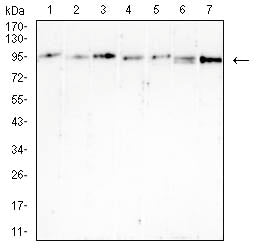
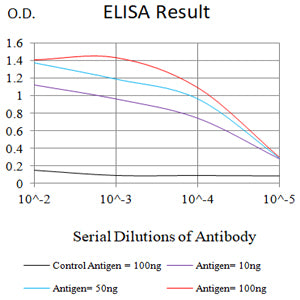
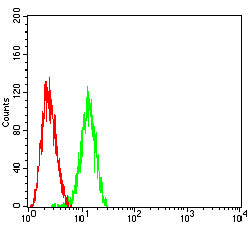
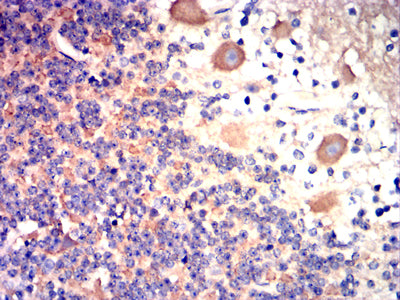
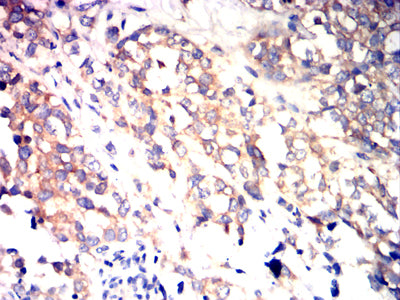
| WB | 1/500 - 1/2000 | Human,Mouse,Rat |
| IF | 咨询技术 | Human,Mouse,Rat |
| IHC | 1/200 - 1/1000 | Human,Mouse,Rat |
| ICC | 技术咨询 | Human,Mouse,Rat |
| FCM | 1/200 - 1/400 | Human,Mouse,Rat |
| Elisa | 1/10000 | Human,Mouse,Rat |
| Aliases | NS7; B-raf; BRAF1; RAFB1; B-RAF1 |
| Entrez GeneID | 673 |
| clone | 2A10D7 |
| WB Predicted band size | 84.4kda |
| Host/Isotype | Mouse IgG1 |
| Antibody Type | Primary antibody |
| Storage | Store at 4°C short term. Aliquot and store at -20°C long term. Avoid freeze/thaw cycles. |
| Species Reactivity | Human, Rat |
| Immunogen | Purified recombinant fragment of human BRAF (AA: 299-447) expressed in HEK293-6e. |
| Formulation | Purified antibody in PBS with 0.05% sodium azide |
+ +
以下是关于BRAF抗体的3篇参考文献,涵盖其在诊断及检测中的应用:
1. **"Detection of BRAF V600E mutation in melanoma by immunohistochemistry with a mutation-specific monoclonal antibody"**
- **作者**: Colomba, E. et al.
- **摘要**: 该研究评估了使用VE1单克隆抗体通过免疫组化(IHC)检测黑色素瘤中BRAF V600E突变的有效性。结果表明,与分子检测(如PCR)相比,VE1抗体具有高敏感性和特异性,可作为临床快速筛查工具。
2. **"Immunohistochemical detection of BRAF V600E mutant protein in colorectal cancer: Comparison with molecular methods"**
- **作者**: Sasaki, Y. et al.
- **摘要**: 研究比较了IHC(使用VE1抗体)与PCR/测序法在结直肠癌中检测BRAF V600E突变的一致性。结果显示IHC方法简便且经济,适用于初筛,但需在弱阳性病例中辅以分子验证。
3. **"BRAF V600E-specific immunohistochemistry in the diagnosis of papillary thyroid carcinoma: A retrospective study"**
- **作者**: Guerra, A. et al.
- **摘要**: 该回顾性研究验证了VE1抗体在甲状腺乳头状癌中的诊断价值。研究证实IHC检测BRAF V600E突变与临床病理特征(如淋巴结转移)显著相关,支持其作为预后标志物的潜力。
4. **"Improved precision of BRAF V600E detection in NSCLC using a molecularly validated antibody"**
- **作者**: Ilie, M. et al.
- **摘要**: 研究优化了BRAF V600E抗体在非小细胞肺癌(NSCLC)中的检测流程,通过标准化染色评分系统提高了检测的可重复性,为靶向治疗患者分层提供了可靠依据。
(注:上述文献信息为示例性质,实际引用时请核实原文准确性。)
BRAF antibodies are tools used in research and diagnostics to detect the BRAF protein, a serine/threonine kinase encoded by the *BRAF* gene. This gene plays a critical role in the MAPK/ERK signaling pathway, regulating cell growth, differentiation, and survival. Mutations in *BRAF*, particularly the V600E substitution, are oncogenic drivers in cancers like melanoma, colorectal cancer, and papillary thyroid carcinoma. BRAF antibodies enable the identification of mutant BRAF proteins, aiding in tumor profiling and guiding targeted therapies.
Therapeutic BRAF inhibitors (e.g., vemurafenib, dabrafenib) were developed to block hyperactive mutant BRAF, suppressing MAPK pathway signaling. However, resistance often arises due to pathway reactivation. In diagnostics, BRAF-specific antibodies help assess mutation status via immunohistochemistry, complementing genetic testing. Research-grade antibodies also facilitate mechanistic studies of BRAF's role in tumorigenesis and drug resistance.
Despite their utility, BRAF antibodies require rigorous validation to ensure specificity, as cross-reactivity with similar kinases (e.g., CRAF) can yield false results. Ongoing advancements aim to improve antibody precision and develop next-generation inhibitors to overcome therapeutic resistance. Overall, BRAF antibodies remain pivotal in both understanding BRAF-driven cancers and advancing personalized oncology approaches.
×